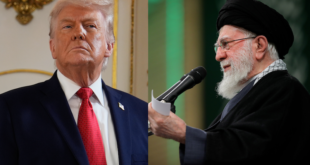Being the world’s leading reserve currency has allowed the United States to enjoy a massively inflated standard of living: that one is coming to an end.
For decades, the US dollar has been the undisputed king of global currencies, but dramatic changes are happening.
China, Russia, India, Brazil, Saudi Arabia and other countries are taking important steps that will allow them to become much less dependent on the US dollar in the years to come .
This is very bad news for the United States, as being the world’s leading reserve currency has allowed it to enjoy a massively inflated standard of living.
Once they lose this status, their lifestyles will be very different from what they are today .
Unfortunately, most Americans [and more broadly, Westerners] don’t understand any of this.
Even though their leaders have treated the stability of their currency with the utmost contempt in recent years, most Americans assume that the dollar will always reign supreme .
Meanwhile, much of the planet is preparing for a future in which the US dollar will be far less important than it is today.
The 7 signs of accelerating dedollarization
Here are 7 signs that global dedollarization has just kicked into high gear:
- The BRICS countries account for more than 40% of the world’s population and almost a quarter of the world’s GDP
The fact that they are working on a “ new currency ” should therefore concern us all.
Deputy Speaker of Russia’s State Duma Alexander Babakov said on March 30 that the bloc of emerging economies BRICS (Brazil, Russia, India, China and South Africa) is working on developing a ” new currency” which will be presented at the next summit of the organization in Durban .
Mr. Babakov, on the sidelines of the business forum of the Russian-Indian strategic partnership for development and growth, spoke on this subject:
“ The transition to settlements in national currency is the first step ”.
” The next step is to enable the circulation of digital currencies or any other fundamentally new form of money in the near future .”
“ I think that during the BRICS summit, the will to carry out this project will be announced, this work is in progress ”.
Mr. Babakov also said that a single currency could probably emerge within the BRICS, and that it would be linked not only to the value of gold, but also:
“ Other product groups, rare earth elements or soils ”.
- A major new trade agreement between China and Brazil
Two of the BRICS nations, China and Brazil, have just reached an agreement to trade in their own currencies .
The Chinese renminbi is accelerating the expansion of its global use, a trend that will help build a more resilient international monetary system that is less dependent on the U.S. dollar and more conducive to trade growth, experts said recently .
The comments came after China and Brazil – two major emerging economies and members of the BRICS – apparently reached an agreement to trade in their own currencies, abandoning the US dollar as an intermediary.
The agreement will allow China and Brazil to carry out their important commercial and financial transactions directly, by exchanging RMB for reals and vice versa, instead of going through the dollar, Agence France-Presse reported last Wednesday . , citing the Brazilian government.
- Southeast Asian nations on the way to monetary independence
At a meeting last week in Indonesia, finance ministers from ASEAN [Association of Southeast Asian Nations] countries discussed ways to “reduce reliance on the U.S. dollar , the euro, the yen and the pound sterling ”.
An official meeting of ASEAN finance ministers and central bank governors opened on Tuesday (March 28th) in Indonesia.
At the top of the agenda are discussions to reduce the dependence of financial transactions on the US dollar, euro, yen and pound sterling and to move to settlements in local currencies.
Meeting participants discussed efforts to reduce reliance on major currencies through the Local Currency Transaction (LCT) system.
It is an extension of the Local Currency Settlement (LCS) system that has already begun to be implemented among ASEAN members .
- Saudi Arabia and its oil joined the Shanghai Cooperation Organization
In a move that has huge implications for the ‘petrodollar’, Saudi Arabia has just agreed to become a ‘ dialogue partner within the Shanghai Cooperation Organization ‘.
The state-run Saudi Press Agency said that in a session chaired by King Salman bin Abdulaziz, the Saudi cabinet on Tuesday approved a memorandum granting Riyadh dialogue partner status in the Organization of Shanghai Cooperation – a political, security and trade alliance of which China, Russia, India, Pakistan and four other Central Asian nations are full members.
The organization also has four observer states – including Iran – and nine dialogue partners, including Saudi Arabia, Qatar and Turkey .
It has its headquarters in Beijing and its general secretary is the Chinese Zhang Ming.
- China begins to make major international settlements in yuan
The Chinese have just completed their very first exchange of liquefied natural gas settled in Chinese currency rather than in US dollars.
China has just completed its first liquefied natural gas (LNG) transaction settled in yuan, the Shanghai Petroleum and Natural Gas Exchange announced on Tuesday.
Chinese oil and gas giant CNOOC and Total Energies completed the first LNG transaction on the exchange with settlement in Chinese currency, the exchange said in a statement picked up by Reuters .
” The trade involved approximately 65,000 tonnes of LNG imported from the United Arab Emirates (UAE) ,” the Shanghai Petroleum and Natural Gas Exchange added.
- India’s monetary emancipation attempt as well
The Indian government offers its currency as an ” alternative ” to the US dollar in international trade.
India will offer its currency as an alternative for trade with countries facing dollar shortages following the US Federal Reserve’s biggest monetary policy tightening in decades .
” Facilitating rupee trade for countries facing currency risk will protect them from disasters ,” Commerce Secretary Sunil Barthwal said when announcing India’s foreign trade policy , Friday in New Delhi.
- Saudi Arabia allows Kenya to pay for its oil in Shillings
Saudi Arabia has agreed to pay for its oil deliveries to Kenya in Kenyan shillings rather than US dollars.
Kenyan President William Ruto signed an agreement with Saudi Arabia to buy oil in Kenyan shillings instead of US dollars .
As the US currency exchange rate hit 145.5 shillings due to increased demand from importers, President Ruto accused oil cartels of hoarding US dollars in response to the crisis, causing shortages of fuel throughout Kenya.
Conclusion
10 years ago none of this would have happened. But today, change is happening at an absolutely breathtaking rate.
Right now, John Carney warns that a burst in global currency reserves is inevitable.
“ It’s not just a serious threat, I think it’s inevitable. As you said, we went through three stages after the Second World War ”.
“ The United States was the largest economy in the world. In the 1970s, the global banking system became essentially dollar-centric .
” With the fall of the Soviet Union, the whole world more or less came under the dominance of the US dollar .”
“ This situation is going away. China and Russia are starting to build an alternative currency bloc .” – Fox Business
If US relations with Russia and China continue to deteriorate, both countries will have every interest in pushing dedollarization even further.
This is very bad news for the United States because its currency is the source of its economic power and it is the main tool of its world domination.
This is a story of monumental importance, but unfortunately most Americans still believe that their leaders know exactly what they are doing and that they have everything “under control”.
 Eurasia Press & News
Eurasia Press & News



